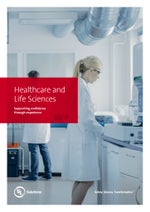
Medical Testing Services Overview Brochure (English)
Connecting medical devices with integrated systems to improve patient care.

Medical device interoperability is essential to the practice of modern medicine. We can help you navigate the relevant international standards that address segments of this technology space.
Clinical measurements such as blood pressure and temperature, X-ray and ultrasound imaging, administration of intravenous medications, and support of critical life functions all require medical devices. However, despite our reliance on sophisticated medical equipment, most devices are not designed to interconnect with other devices. Therefore, it is difficult to connect individual devices into integrated medical systems to improve patient care, avoid unnecessary accidents and obtain comprehensive data to personalize care delivery.
Our teams take a multifaceted approach to reduce key barriers to achieving interoperability, including:
Additional technology-specific standards exist and serve to aid in the development of interoperable devices including the IEEE 11073 Health Informatics series, and other standards and supporting documents from HL7, IEEE and IHE. Standards such as ASTM F2761-09 (2013), the Standard for Medical Devices and Medical Systems — Essential Safety Requirements for Equipment Comprising the Patient-Centric Integrated Clinical Environment (ICE) — Part 1: General Requirements and Conceptual Model. Others include the AAMI HIT 1000 series, such as AAMI HIT1000-1 (PS):2018 — Safety and Effectiveness of Health IT Software and Systems — Part 1: Fundamental Concepts, Principles, and Requirements. This identifies the core concepts and principles needed to maintain safe and effective health IT software and systems and provides general requirements and a high-level architecture for an integration platform.
A number of relevant international standards —including ISO 14971, the Standard for Medical Devices — Application of Risk Management to Medical Devices, and IEC 60601-1, the Standard for Medical Electrical Equipment — Part 1: General Requirements for Basic Safety and Essential Performance, already successfully address segments of this technology space. IEC 80001 series, The Application of Risk Management for IT-Networks Incorporating Medical Devices, adds additional criteria for addressing the technology-specific risk of integrating medical devices into hospital IT networks.
Several challenges prevent the healthcare community from realizing the full potential of device interoperability. These challenges include technical issues (the mechanics of interoperability), systems engineering issues (repeatable processes for correctly and efficiently integrating devices into larger systems), and overarching reliability, safety and security challenges. We have been collaborating for more than a decade with the MD PnP team and other such research organizations to develop sharable databases, open-source tools and applications that will enable a broader community of researchers and manufacturers to implement secure medical device interoperability.

Medical Testing Services Overview Brochure (English)
Thanks for your interest in our products and services. Let's collect some information so we can connect you with the right person.